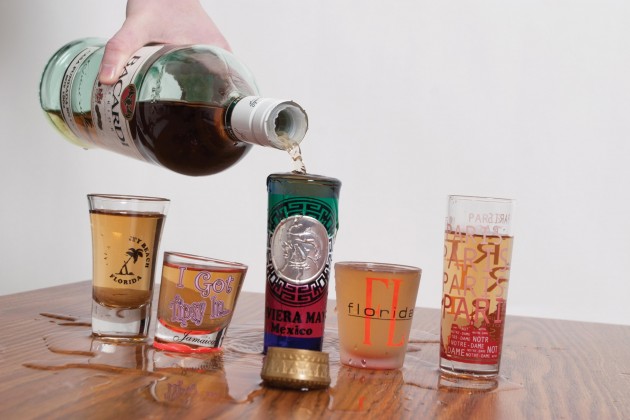
DePauw students are proud of their reputation as the smallest school on Princeton's top 20 party schools, but university administrators don't seem quite as impressed.
The committee to study the use of alcohol on campus released an Executive Summary and Recommendations for the university this December. The report consisted of the committee's findings about the university's alcohol culture, along with a summary of the university's proposals for how to encourage and educate about more responsible drinking.
Cindy Babington, vice president for student life, formed the committee in the fall of 2010 after student government passed a white paper calling for a change in the alcohol policy. The changes proposed in 2010 included the allowance of kegs at events and parties.
The committee chaired by Babington consists of students, faculty, staff and alumni. It first met during the spring of 2011. Their plan is to study student use of alcohol on DePauw's campus and to make recommendations for changes to the alcohol policy, as well as to employ new party management guidelines and education and prevention methods.
"The committee, as a whole, reviewed data from the social norms research program Students Opting for Alcohol and Drug Free Residence, commonly known as SOAR, the CORE survey and data regarding hospital runs," Babington said. "The large committee divided into four sub-committees [that] explored the various topics and came up with the findings."
The committee also works to make recommendations for solutions to the alcohol problem, that are then assigned to various members of the Student Life staff to either be implemented or researched further. In the committee's report, issues such as alcohol education, enforcement, sanctions, pre-gaming, Winter Term drinking, and campus parties and events were discussed and researched.
In the alcohol report, the committee looked at the DePauw's current efforts to cut down on what the administration believes is the student body's irresponsible use of alcohol. Programs such as the online class on alcohol, MyStudentBody.com, Party House — an interactive alcohol education for freshmen soon after they arrive on campus — as well as residence hall educational bulletin boards appear to be effective tools.
The university wants to continue brainstorming for ideas and implementing more preventative measures for alcohol abuse. The main suggestion for alcohol education is the clear communication of each of the current program's goals. The committee also recommended constantly assessing the programs to make sure each goal is being accomplished effectively. Along with the improvement of current programs, the university would also like to see SOAR gain a more prominent position on campus.
In regards to enforcement, the committee found that the overall view of Public Safety's enforcement of university policy is favorable and that there is a balance between being strict and lenient when enforcing the policy. The committee also supports Public Safety in the Community Standards process of issuing citations. Conversely, the committee applauds Public Safety for acknowledging "big party" weekends and adapting appropriately.
There were, however, some members of the Committee who felt Public Safety shields students from "real world" consequences of alcohol-related incidents.
"Student and campus safety should drive enforcement efforts related to university alcohol policy," Babington said.
The Committee also found that first-year students view RAs as strict when it comes to the alcohol policy, however they also found that first-year students tend to keep hard liquor in their rooms more than anything else because it is easiest to hide.
When studying the Community Standards system, the committee found that the recidivism, being entered back into the program, rate for alcohol policy violation is only 16 percent, however it could not be determined if this reflected changes in behavior. Also, when speaking to students who have gone through the Community Standards process, many said it was fair, but not many found it educational.
Another large issue that the committee pinpointed at the university is "pre-gaming." According to the committee, "pre-gaming" has become increasingly high risk because of a transformation from "social pre-gaming" to "binge pre-gaming." Frequently pre-gaming occurs in areas with "no alcohol" policies such as sororities, according to the report.
Another concern voice by the committee is Winter Term. Despite Interfraternity Council policies forbidding first-year students from Greek property during Winter Term, heavy drinking still remains very prevalent. The laid-back structure of on-campus Winter Term was cited as a possible cause for the increase in high-risk drinking, as well as the presence of students who are not enrolled in any classes. The committee discussed changing the on-campus Winter Term structure.
As the committee continues to explore ways to better educate the campus about alcohol, ideas such as implementing security at parties with over 200 people in attendance, considering a pilot program allowing kegs at a small number of parties, restructuring Winter Term academic policies and even scheduling more early morning classes to prevent late night partying.
The report will be posted on Moodle, so the entire campus community can soon have access to it.
As a member of the group Learning Collaborative on High-Risk Drinking, comprised of 32 institutions, DePauw plans to continue improving and researching their objectives and effectiveness throughout the next 16 months.
|
Alcohol Report Quick Facts - DePauw has joined Learning Collaborative on High-Risk Drinking, a group comprised of 32 institutions that focuses on becoming better educated about how to change the campus drinking culture. - The group, coordinated by Dartmouth University, began meeting in December and will continue meet for the next 16 months to implement, study and report on specific interventions intended to decrease the levels of high-risk drinking on our campuses. - DePauw is considering reviewing and revising requirements for on-campus Winter Term programs. - One of the university's ideas for limiting late night partying is to put more early morning classes on the schedule. - DePauw is considering creating a pilot program allowing kegs at a small number of student parties and events. |
